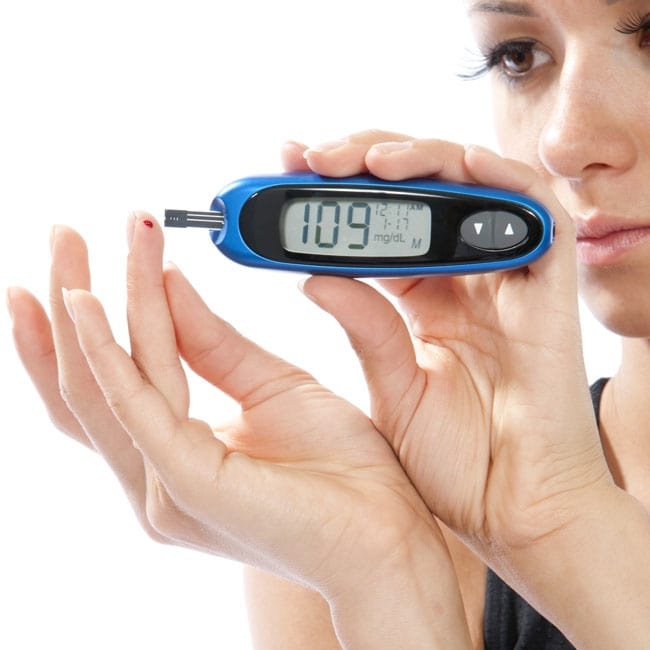The diagnosis of Type I diabetes is a stressful one that requires a lifelong overhaul of eating behaviors. Depending on the coping ability and support system that each patient has in place, stress of the diagnosis, frequent medical visits, feeling “different” from peers and worrying about long-term health, can trigger an eating disorder. Some patients with Type I diabetes may be more susceptible to developing an eating disorder than others, for example, those with pre-existing or resulting depression, or with a family history of eating or mental health issues. The need to pay more than unusual attention to eating and health can cause preoccupation with eating, fear of eating, fear of experiencing side effects, secret eating, or binge-eating behavior. In general, individuals with Type I diabetes are not prohibited from eating any specific foods, but they may need to limit certain foods that specifically affect their blood glucose levels. Additionally, Type I diabetes can also co-occur with food allergies or celiac disease, where preoccupation with food and food safety is already a necessity.
The treatment for Type I diabetes is multiple daily insulin shots or a constantly worn insulin pump prescribed by a doctor, nurse or nurse practitioner based on each patient’s individual needs. Initially, there may be a trial and error process to determine the insulin prescription and regime, during which some weight gain may occur. Weight gain can also result from stress-related overeating, overeating as a form of rebellion against the diagnosis, and/or overeating due to fear of hypoglycemia (“going low”) which can cause fainting and, when severe, coma and death.
If a patient is particular sensitive about weight gain or was already wishing to lose weight, even a small amount of weight gain can be disproportionately distressing. If the patient is determined to lose weight or is afraid to gain weight, he or she may choose to manipulate the volume or frequency of the prescribed insulin shots.
Although this may have the desired effect on weight, it also causes dangerous side effects including lifelong blindness and permanent numbness of fingers and toes that can require amputation. These side effects do not occur immediately, so the patient may not realize that they are happening until it’s too late. In some cases, patients are depressed following the diagnosis of diabetes, or for other reasons, and the danger of complications is not a deterrent. In cases where the patient has a pathological preoccupation with weight, he or she may be willing to risk the serious side effects because of a misguided overvaluation of weight loss. And in other cases, the patient simply does not recognize the danger he or she is in.
In addition to the life- and limb-threatening side effects of diabulimia, manipulating insulin can also cause:
- Exhaustion
- Dehydration
- Inability to think clearly
- Muscle loss
- Indigestion
- High cholesterol
- Bacterial skin infections
- Yeast infections
- Menstrual disruption
- Staph infections
- Peripheral arterial disease
- Fattening of arterial walls
- Infertility
- Gum disease
- Liver disease
- Stroke
Diabulimia often goes unnoticed for a long period of time, while the primary care provider simply provides more and more and more insulin that the patient continues not to use. The patient may be the first person in the family to be diagnosed with Type I diabetes, so no one else may even be aware it exists, much less right there in their home.
American Diabetes Association statistics* suggest that diabulimia is so common among teens with Type I diabetes that it should always be addressed; however, some professionals and family members worry that discussing diabulimia will make teens more likely to try it. Because information is easily accessable on the Internet, it seems wise to educate teens of the very real and very severe risks of diabulimia. Additionally, family members should supervise insulin administration when blood glucose and hemoglobin A1C levels are outside of appropriate ranges, and seek evaluation by an eating disorder specialist if diabulimia is suspected.
Diabulimia Treatment and Recovery
Diabulimia requires a combination of treatment techniques and professionals with expertise in eating disorders, psychiatry, nutrition, diabetes, and other specialty areas. The two disease processes that combine to create diabulimia cannot be treated successfully in isolation. In most cases, diabulimia treatment will require hospitalization. This is necessary to stabilize eating, exercise, lab values, medications and medical status in an environment that is monitored around the clock by nursing staff. A detailed and accurate log of all these factors will be needed to determine a new insulin prescription.
It is important that this process take place in a safe and supportive environment, as it takes time to adapt from diabulimia to appropriate insulin and glucose levels. In some cases, patients experience physical discomfort as they heal from dehydration and starvation, and will need encouragement at meals and, in some cases, supplementary nutrition in addition to food.
We Can Help
If you or someone you know is suffering from diabulimia, fear of weight gain related to a medical diagnosis, or any other eating disorder The Meadows Ranch can help guide you on what steps to take toward a better life. Our phones are answered 24 hours a day.
For additional information about our programs and other resources please call to speak to a Counselor at 866-390-5100 or complete a form, and we will contact you with the information you need.
*The American Diabetes Association found that adolescent girls with type 1 diabetes were 2.4 times more likely to develop an eating disorder than girls without diabetes (Mohney, Gillian. “Diabulimia: The Dangerous Way Diabetics Drop Pounds.” ABC News. ABC News Network, 08 Mar. 2013. Web. 15 Oct. 2014.). And it is estimated 30-40% of young girls and women with type 1 diabetes have or will have an eating disorder at some point in their lives.

